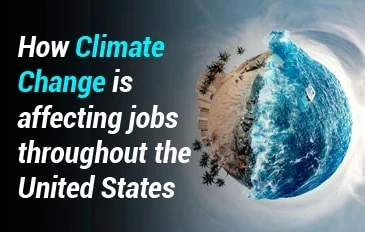How Climate Change is Effecting jobs throughout the United States

How Climate Change is affecting jobs throughout the United States
Climate change is having a significant impact on the global economy, and many jobs are being directly or indirectly affected by the changes in our climate. Some of the most vulnerable jobs are those that are dependent on natural resources, such as agriculture and fishing, while other jobs, such as construction and manufacturing, may also be at risk as the demand for certain products and materials changes.
Agriculture is a sector that is particularly vulnerable to the effects of climate change. Drought, extreme weather events, and shifting temperatures can all have a negative impact on crop yields and livestock health. This can lead to job losses for farmers and those who work in the agriculture industry.
Fishing is another sector that is heavily dependent on natural resources and is therefore vulnerable to the impacts of climate change. Warmer water temperatures and changes in ocean currents can affect the abundance and distribution of fish, leading to declines in catches and reduced employment opportunities for fishermen and those working in the fishing industry.
Construction and manufacturing are also sectors that could be impacted by climate change. As demand for renewable energy technologies and sustainable building materials increases, there may be a shift in the demand for certain products and materials. This could lead to job losses in the fossil fuel industry and job gains in the renewable energy sector.
The tourism industry is another sector that could be affected by climate change. Extreme weather events, such as hurricanes and heatwaves, can deter tourists from visiting certain destinations, leading to reduced demand for travel and hospitality services. This could lead to job losses for those working in the tourism industry.
The impact of climate change on jobs is not limited to these specific sectors. It is likely that any job that is dependent on natural resources or the environment could be affected in some way by the changing climate. It is important for workers and employers to be aware of these potential impacts and to consider the long-term sustainability of their jobs and industries.
There are also many job opportunities emerging in the field of climate change adaptation and mitigation. These jobs include roles in renewable energy, sustainable agriculture, and conservation. As the demand for these services increases, so too will the demand for workers with the necessary skills and expertise.
In conclusion, climate change is having a significant impact on the global economy and many jobs are being directly or indirectly affected. Some of the most vulnerable jobs are those that are dependent on natural resources, such as agriculture and fishing, while other sectors, such as construction and manufacturing, may also be at risk as the demand for certain products and materials changes. It is important for workers and employers to be aware of these potential impacts and to consider the long-term sustainability of their jobs and industries. There are also many job opportunities emerging in the field of climate change adaptation and mitigation, providing a chance for workers to transition to more sustainable and resilient careers.
Michael DeSafey is a leading executive recruiter for professionals in the construction, engineering, and environmental industries. He is currently the President of Webuild Staffing: www.webuildstaffing.com. To learn more about Michael, or to follow his blog, please visit www.michaeldesafey.com.
Category: Environmental, Jobs
